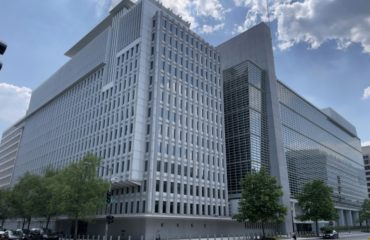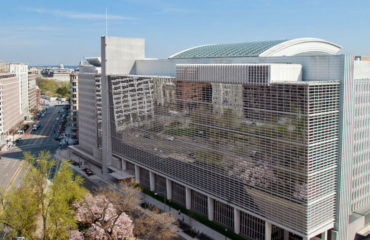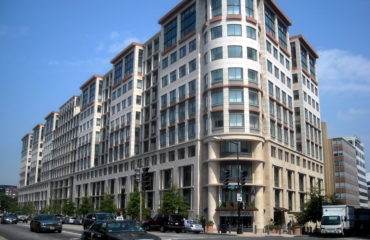Estimated reading time: 7 minutes
The World Bank Group (WBG) is the world’s largest multilateral development agency. Whilst the World Bank is technically an agency of the UN system, it is truly independent and has different sources of funding. But how much do you know about the WBG? What does the WBG do?
In this article, we will show 5 facts that you should know about the World Bank Group and what the organization stands for – crucial information if you ever want to start a career at such an impactful IGO!
In pursuit of its mission, the OpenIGO network has prepared a comprehensive eBook and support and guidance services with the aim of highly increasing your chances of success in this competitive process.
Our comprehensive eBook will introduce you to the complex world of the World Bank Group and its approach towards international development, as well as will teach you how to prepare each of the documents required in detail, and will also get you ready for the interview and assessment center. This eBook was written and revised by a team of professors, human resources specialists, and former young professionals with a great deal of diligence.
In addition, we have developed support and guidance services. These services include revising your WBG YPP application documents (essay, curriculum vitae, and thesis/dissertation short summaries) and a mock interview as per the World Bank YPP model.
Having a mock interview with a professional who has extensive experience and knowledge of the World Bank YPP interview model will help you be better prepared for this phase, greatly increasing your chances of being selected for the desired vacancy.
WOULD YOU LIKE TO KNOW MORE ABOUT OUR WORLD BANK YPP PRODUCTS & SERVICES?
World Bank YPP – Products and Services
Would like to know more about World Bank career opportunities? Then check our WBG Jobs overview right now:
Want to discover how to write the perfect essay for the WBG YPP? Then check out our article on the topic!
Fact #1 The World Bank was created out of the Bretton Woods Conference
On July 1, 1944, while the Second World War was still happening, representatives from 44 nations met at the Mount Washington Hotel in Bretton Woods, New Hampshire in order to participate in what would be subsequently called the Bretton Woods Conference.
The goal of these representatives was to engender a system of economic rules and international cooperation that would assist countries in recovering from the destruction that was being caused at that very moment by the war and to promote global growth in the long run.
At the end of the Conference, the participants produced the Articles of Agreement for the International Bank for Reconstruction and Development (IBRD) and the International Monetary Fund (IMF).
The IBRD would later be part of the World Bank Group, as it came into formal existence on 27 December 1946, after the international ratification of the agreements reached at the Bretton Woods Conference.
Fact #2 The World Bank Group consists of five organizations
The WGB is comprised of five institutions. They are:
- The International Bank for Reconstruction and Development (IBRD): The IBRD offers loans to governments of middle-income and creditworthy developing countries.
- The International Development Association (IDA): The IDA provides concessional loans and grants to governments of the poorest developing countries. It should be noted IBRD and IDA together are referred at the World Bank.
- The International Finance Corporation (IFC): The IFC is the world’s largest development institution focused entirely on the private sector.
- The Multilateral Investment Guarantee Agency (MIGA): MIGA’s aim is to promote foreign direct investment into developing countries in order to foster economic growth and improve the quality of life.
- The International Centre for Settlement of Investment Disputes (ICSID): The ICSID supplies international facilities for conciliation and arbitration of disputes between international investors and States.
Fact #3 The WBG is a partner to the UN in the SGDs agenda
To monitor the 17 Sustainable Development Goals (SDGs), a framework of more than 200 indicators was developed by the Inter-agency and Expert Group on SDG Indicators (the IAEG-SDGs), a group of UN Member States that has international agencies as observers.
The World Bank (composed of IBRD and IDA) participates in IAEG-SDGs as an observer and it is a custodian for 20 indicators, as well as being involved in the development and tracking of more 22 indicators. Therefore, the World Bank is engaged with at least 42 indicators.
These indicators cover a wider range of topics that are in World Bank’s fields of expertise, such as: poverty and inequality, social protection, gender equality, health, energy, infrastructure, and much more.
Would like to know more about World Bank internship opportunities? Then check our WB Internships overview:
World Bank Internships Overview
Fact #4 The World Bank has an Initiative to improve Asian cities air quality
The Clean Air Initiative for Asian Cities was designed to be a network to help major cities in Asia to tackle their air quality problems. The initiative was established by a group of cities and organizations, including the World Bank and the Asian Development Bank (ADB).
The mission of the Initiative is to promote and demonstrate innovative ways to improve the air quality of Asian Cities through a partnership and sharing of experience.
Among the accomplishments of the Initiative, are: the implementation of air pollution control regulations and standards; policies that are energy efficient; the implementation of sustainable financing mechanisms and fiscal policies aimed at air pollution control; and, finally, technical specifications to assist in reducing air pollution.
Fact #5 The WBG has a sanction system to address fraud and corruption
In 1998, The World Bank Sanctions Committee was established to analyze sanctions cases against firms and person suspected of taking part in misconduct, fraud, corruption, coercion, collusion or obstruction (referred to collectively as Sanctionable Practices) in connection with World Bank-financed projects.
The sanctions regime was designed to protect the funds entrusted to the World Bank, while, at the same, offering firms and individuals being accused an opportunity to respond to the allegations that are made against them.
There are 5 administrative sanctions possible in this regime: Debarment, Debarment with Conditional Release, Conditional Non-Debarment, Public Letter of Reprimand, and Restitution.
Under the sanctions regime, operate two administrative bodies:
- The Office of Suspension and Debarment (OSD): It provides the first level of independent adjudication in the World Bank’s sanctions system. When there is sufficient evidence of misconduct, OSD temporarily suspends the accused firm or individual and, in case there is no appeal, it imposes the final sanction.
- The World Bank Group Sanctions Board: Being composed of 7 external judges, the board is an independent administrative tribunal that works as the final decision-maker in all contested cases of sanctionable misconduct in development projects financed by the WBG.
In pursuit of its mission, the OpenIGO network has prepared a comprehensive eBook and support and guidance services with the aim of highly increasing your chances of success in this competitive process.
Our comprehensive eBook will introduce you to the complex world of the World Bank Group and its approach towards international development, as well as will teach you how to prepare each of the documents required in detail, and will also get you ready for the interview and assessment center. This eBook was written and revised by a team of professors, human resources specialists, and former young professionals with a great deal of diligence.
In addition, we have developed support and guidance services. These services include revising your WBG YPP application documents (essay, curriculum vitae, and thesis/dissertation short summaries) and a mock interview as per the World Bank YPP model.
Having a mock interview with a professional who has extensive experience and knowledge of the World Bank YPP interview model will help you be better prepared for this phase, greatly increasing your chances of being selected for the desired vacancy.
WOULD YOU LIKE TO KNOW MORE ABOUT OUR WORLD BANK YPP PRODUCTS & SERVICES?
World Bank YPP – Products and Services







